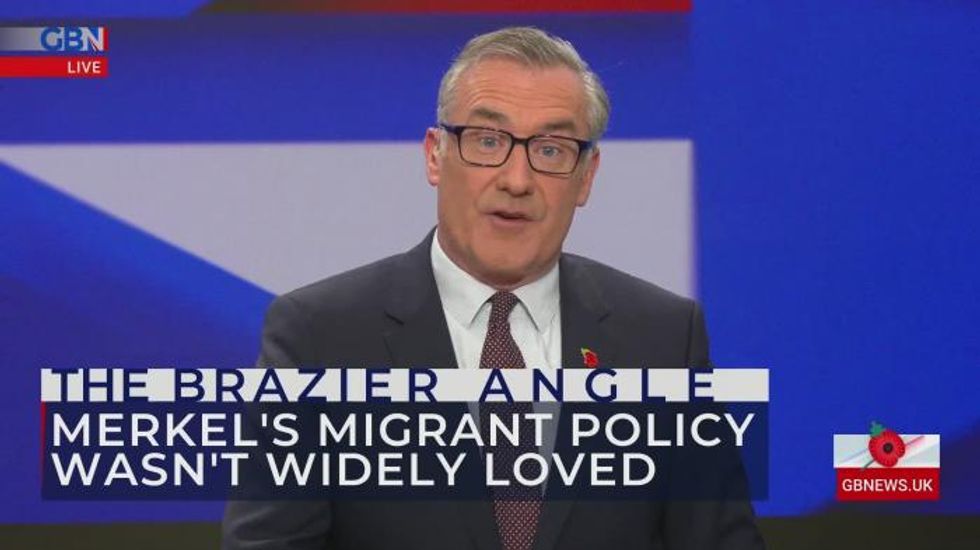Don't Miss
Most Read
Trending on GB News
Six years ago more than a million people were beckoned by Angela Merkel to start a new life in Germany. Unfortunately, she hadn’t asked if that was okay with the nations through which this mass of humanity would pass. Some took the view that the simplest thing to do was to make it as easy as possible for migrants to move through their territory; the quicker to become Berlin’s responsibility.
Others were decidedly prickly. What with it being their land and all. Budapest especially. In scenes that are being repeated right now on the Polish border, I ducked a few rocks as Hungarian riot police clashed with migrants on their border with Serbia. Eventually, many of the migrants got the message and chose a line of lesser resistance. They skirted around Hungary and got into Western Europe via Croatia. Some of them will now be living in Britain.
Why didn’t the Hungarians just open their border gates and wave the migrants through? The same question is being asked right now of the Poles. At one level the situation is very different. In 2015 there was a widespread belief that Germany was making a big-hearted response to a humanitarian crisis in Syria, even if a great many of those on the move were actually from the Balkans or Bangladesh. But 2021 is obviously different. The migrants on Poland’s border may be from the Middle East, but they are being used as pawns in a row between Putin-friendly Belorussia and EU-member state Poland.
But there’s a key component to this story that we in the West overlook. In fact we don’t overlook it, because that suggests we know about it in the first place. No, this is something we fail to see because we in Western Europe are all too often ignorant about the culture and history of Eastern Europe; it’s an Unknown Unknown.
So let me take you back to 2015 and Hungary. I remember travelling south from Budapest to the Serbian border in the company of a local driver and translator. As we drove along, beyond mobile range, our only way of keeping in touch with events was through the radio, which we listened to on the hour. One day, at noon, the local station didn’t start with the headlines. There was a long, solemn pause, followed by a bell chiming. Where, I asked, was the news? My translator explained this was the news, but from about three or four centuries ago, when Hungary finally threw off the yoke of their hated Ottoman Muslim occupiers.
Today, we in Britain remembered Armistice Day. If we can vividly call to mind events more than a hundred years ago, is it really so surprising if parts of Eastern Europe still cleave to events three times distant?
And as with Hungary, so with Poland, which is today celebrating its national Day of Independence. When Britons think of Poles riding to their rescue, they probably think of the time a Polish plumber was willing to answer an emergency call-out that nobody else would. But in Poland, their thoughts turn to something grander. The charge, the biggest cavalry charge in human history, led by the King of Poland, John Sobieski, to relieve the Ottoman siege of Vienna in 1683 and deliver Europe, decisively and finally, from a Millennium of Islamic eastward expansion.
They remember it still. Far better than their more affluent western neighbours. In fact the Poles have been struggling recently to persuade the Austrians to accept a huge statue of John Sobieski. The Viennese were apparently leery of offending local Turks.
The idea of occupation is alien to our island nation. But for many Eastern Europeans it’s a tangible historical reality. If not invasion by the Ottomans, then the far more recent arrival of Soviet tanks.
The Polish in particular look back at their history, and see reasons why Western Europe owes them, not just understanding, but gratitude.
Not just King John Sobieski at the Gates of Vienna, but more recently. Jozef Pil-Sud-Ski, who stopped the Bolsheviks from exporting the Russian Revolution to the West at the start of the Twentieth Century. And the Polish Pope, Karol Wojtlya – John Paul the Second to you and I, who led a spiritual uprising that mortally wounded the USSR in the latter half of the Twentieth Century.
Do they see themselves as the defenders of Western civilization? Is that why there are 15,000 Polish soldiers, tonight shivering in the dark forests of their frontier with Belorussia. I don’t know. But I do know that those who airily dismiss Poland, or indeed Hungary, as xenophobic in resisting migrant flows are being intellectually incurious.
The East is not the west. Their history is not our history. Although, when it comes to the migrants massing on Poland’s borders, their problems might soon become ours











